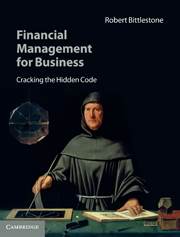Book contents
- Frontmatter
- Contents
- List of figures
- Introduction
- Acknowledgements
- Part 1 A dream of future wealth
- Part 2 The hidden art of management
- 13 The sweet spot
- 14 Elastic bands
- 15 An offer you can't refuse
- 16 The best of both worlds
- 17 Financial Perestroika on Interstate 95
- 18 Loads of money
- 19 Checkmate
- 20 Acts of God
- 21 Acts of men
- 22 Hubble, bubble, double-entry trouble
- 23 Credit crunch conclusion
- 24 Twenty-first-century accounting
- Appendix 1 Mathematical anchor
- Appendix 2 Getting to grips with cash
- Postscript
- Bibliography
- Index
22 - Hubble, bubble, double-entry trouble
from Part 2 - The hidden art of management
Published online by Cambridge University Press: 05 June 2014
- Frontmatter
- Contents
- List of figures
- Introduction
- Acknowledgements
- Part 1 A dream of future wealth
- Part 2 The hidden art of management
- 13 The sweet spot
- 14 Elastic bands
- 15 An offer you can't refuse
- 16 The best of both worlds
- 17 Financial Perestroika on Interstate 95
- 18 Loads of money
- 19 Checkmate
- 20 Acts of God
- 21 Acts of men
- 22 Hubble, bubble, double-entry trouble
- 23 Credit crunch conclusion
- 24 Twenty-first-century accounting
- Appendix 1 Mathematical anchor
- Appendix 2 Getting to grips with cash
- Postscript
- Bibliography
- Index
Summary
Readers may remember Bob from Chapter 17 ‘Financial Perestroika on Interstate 95’. He is Bob Trample, the CEO of Intergroup, a fictitious multinational that I invented in 1993 for the US magazine Chief Executive. The full cast of characters includes Jack Teflon (Sales), Elaine Foster (née Lissom, Marketing), Günter Kaputt (Production), Olaf Brainström (Planning), Kevin Rambite (Systems) and Harry Junkbond (Finance).
A version of the following article appeared in the magazine in the summer of that year and I reproduce it here (with some minor changes) because I think it makes sense to readers who have by now become intuitively familiar with the reality of cash flow versus profit.
You know from using the Simulator just how crucial it is to monitor your purchases, cash receipts and cash payments, so you may be justifiably concerned to realise that very few major companies succeed in bringing this information to the attention of their senior executives.
Bob: Harry, I've asked you to give me some help today because I'm getting increasingly concerned about some of our Board financial schedules. You probably just regard it as Finance 101, but for me it's a real struggle to understand them, and I don't think I'm alone.
Harry: What's the problem, Bob?
Bob: Well I guess there are several problems. First of all, there are so many goddam numbers on each page that it's a real effort to focus on them. It's not as if I don't start each meeting with the best of intentions, you know. […]
- Type
- Chapter
- Information
- Financial Management for BusinessCracking the Hidden Code, pp. 159 - 163Publisher: Cambridge University PressPrint publication year: 2010



